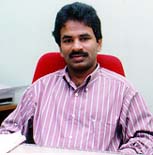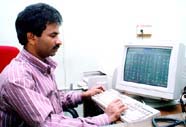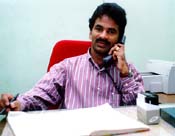The telephone man who bucked the "system"
Shobha Warrier
 You book a telephone and forget about it. Your children or grandchildren may get it if they're lucky. Thatís the joke. If you do want a connection, pay an enormous amount or/and bribe and, viola, thereís a phone in your drawing room. Thatís reality.
You book a telephone and forget about it. Your children or grandchildren may get it if they're lucky. Thatís the joke. If you do want a connection, pay an enormous amount or/and bribe and, viola, thereís a phone in your drawing room. Thatís reality.
Things have just changed, though, in the Mylapore division in Madras. It was among the oldest, crankiest exchanges with even crankier customers, including former chief minister J Jayalalitha and a horde of other touchy ministers. Now a young divisional engineer, Jyothi Sankar, has transformed it to what may be the best exchange in the country, with the R K Nagar exchange, where he was earlier a close second. Strangely, his colleagues arenít annoyed.
When he was posted there, subscribers at the new R K Nagar exchange were amazed they could get telephones on demand. Others who had booked earlier were even more surprised when they received a computer print-out with all relevant details, including their future phone number. They were also informed that they should call the assistant engineer or divisional engineer if no one from the department approached them and that these officials should be alerted if any money was demanded.
 The first thing he did was to take on himself the power to issue orders for new telephone connections from the commercial department. "The commercial office orders come in different series, like a bunch of notes, with no proper order. It is impossible to find out which order should be attended to firstÖ I wanted to streamline the orders."
The first thing he did was to take on himself the power to issue orders for new telephone connections from the commercial department. "The commercial office orders come in different series, like a bunch of notes, with no proper order. It is impossible to find out which order should be attended to firstÖ I wanted to streamline the orders."
Much of his success he attributes to the software he designed. On the computer, he has access to the list of work orders, with priority mentioned. One he knew had the list, no linesman could con him. "He cannot give a line toÖ number 20 without giving connections to the earlier nineteen," says Sankar.
Also, the divisional engineer gives customers a commitment in writing citing the date by which the work will be completed. If the work is not done within the period, the customer can call up the DE. Naturally, work moved fast.
To eliminate resistance from lower level staff, he made himself accessible and convinced them he was one of them. That reduced the stiff opposition he might have faced for denying them their "revenue".
 Jyoti Sankar did not face any opposition from his seniors when he decided to develop his own software to aid his work. In fact, it was his unconventional ways that made the authorities send him to the sensitive Mylapore exchange.
Jyoti Sankar did not face any opposition from his seniors when he decided to develop his own software to aid his work. In fact, it was his unconventional ways that made the authorities send him to the sensitive Mylapore exchange.
Within three years, the Mylapore exchange was offering telephones on demand. From 8000 lines in its 40-year history, the exchange offered 26,000 in the last three. Within two months, the exchange will have 30,000 lines! The exchange has grown 300% during the period as against the 15% growth of the department.
By 7.30 in the morning, Sankar gets a print-out from the exchange, with details about faults,
including the number of them registered, those attended to and those pending.
The telecom department says a division should have not more than 1 per cent of its lines faulty, though the actual number usually far exceeds the limit. The Mylapore and R K Nagar exchanges have done better, recording less than 0.5 per cent faults. All thanks to a government employee who didnít behave like one.
Photographs: Sanjay Ghosh
|





